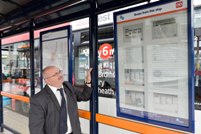
Extremely low energy usage and effectiveness during bright sunshine are highlighted for the ‘world first’ e-paper bus stop wayside
Electronic book-style technology showing bus timetable, ticket price and real time service information has gone on trial in the West Midlands in what is claimed to be a world first.
Centro is trialling an information suite featuring eight ‘state-of-the-art’ e-paper screens, similar to those found in gadgets such as the Kindle, at a bus stop in Halesowen Street, Oldbury.
If successful, the screens could eventually replace traditional paper timetables and electronic displays.
The £50,000 prototype is being claimed by Birmingham consultants IBI Group as a world first. It allows timetable updates to be sent directly from a control centre to the device without the need to send someone to the bus stop to replace paper timetables by hand.
It also has the added benefit of providing ‘next bus’ information in the same unit.
Passengers with NFC (Near Field Communications)-enabled smartphones can also ‘tap’ their phone on each of the displays for more detailed information on the services and the wider public transport network.
The NFC tags link automatically to the most appropriate area of the Network West Midlands passenger information website to make it even easier for passengers to access information directly on their phones.
Gareth Tyler, Intelligent Transport Systems consultant with IBI Group, said: “This is the first implementation of e-paper technology of this kind in the public transport arena.
“It opens the door to enhanced information being readily available to public transport users at bus stops and public places as well as offering significant cost savings and operational benefits to transport authorities such as Centro.”
Cllr Keith Linnecor, Centro’s Lead Member for the Transport Network, said: “It’s fantastic to see this new technology being used here before anywhere else in the world. It puts the West Midlands right at the cutting-edge of passenger information.
“Using e-paper removes the cost and environmental impact of having to physically replace traditional paper timetables and gives us the chance to quickly provide updates when amendments to timetables are made.
“Having the screens function in this way also allows us to display important messages when needed and for passengers to access any extra information they might need straight to their smartphones.”
E-paper is designed to limit glare from sunlight and can be read from wider angles to make it easier for passengers to read even in bright conditions.
The displays only require power when being updated and once refreshed, can retain information without needing any additional electricity.
At 10.2 inches, each display is slightly bigger than the largest Kindle currently available giving them the capacity to display more information.
In the future, the technology could be used to provide key public messages, including updates on service disruptions and information on nearby tram and train services.
As the device consumes so little power, solar-powered versions could also be used at remote locations.
Cllr Linnecor added: “The new system will be trialled until December and we would urge passengers to give us their feedback before we decide on whether to use the technology on a wider basis.”


